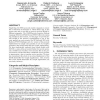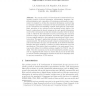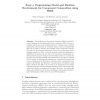124 search results - page 13 / 25 » A Formal Model for Classifying Trusted Semantic Web Services |
CCS
2008
ACM
13 years 9 months ago
2008
ACM
Single-Sign-On (SSO) protocols enable companies to establish a federated environment in which clients sign in the system once and yet are able to access to services offered by dif...
EUROMICRO
2007
IEEE
13 years 9 months ago
2007
IEEE
BPEL is a de-facto standard language for web service orchestration. It is a challenge to test BPEL processes automatically because of the complex features of the language. The cur...
ADBIS
2005
Springer
14 years 1 months ago
2005
Springer
The current period of IT development is characterized by an explosive growth of diverse information representation languages. Applying integration and composition of heterogeneous ...
CBSE
2007
Springer
14 years 1 months ago
2007
Springer
Abstract. The SOAP Service Description Language (SSDL) is a SOAPcentric language for describing Web Service contracts. SSDL focuses on abstraction as the building block for creatin...
SAC
2003
ACM
14 years 22 days ago
2003
ACM
Based on the limitations raised by existing approaches in the context of the Semantic Web, we propose a formalism, Web Sources Global Ontology (WebSOGO), a data meta-model for the...



